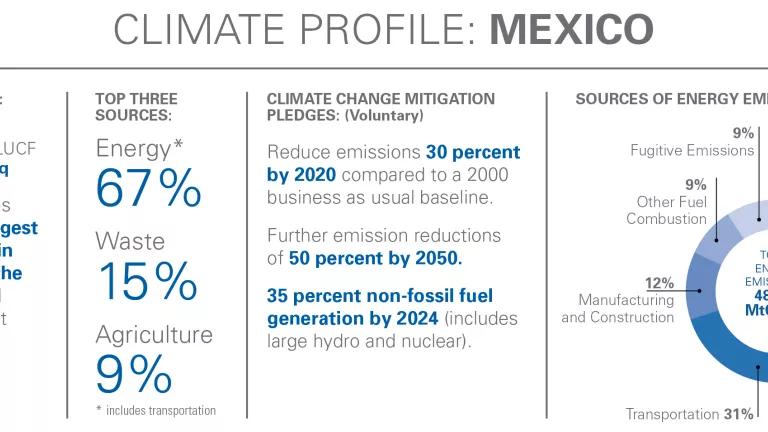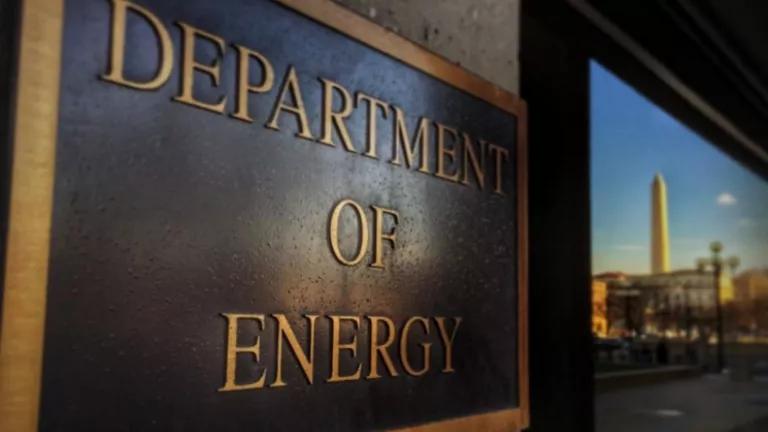Mexico's Energy Legislation Needs to Incorporate Clean Energy in Order to Fight Climate Change

Mexican President Peña Nieto spoke at the 20th Conference of the Parties climate negotiations (or COP) in Lima, Peru last week about Mexico’s commitment to fight climate change, including a commitment of $10 million to the Global Climate Fund and $20 million to the Global Environment Fund. He also highlighted several domestic targets the country established by law in 2012, including a goal of reducing emissions 30 percent by 2020 (over baseline projections), further reducing emissions 50 percent by 2050 (over 2000 levels), and generating 35 percent of energy with sources other than fossil fuels* by 2024. It is clear that, in order to meet these targets, concrete actions will have to be taken in the country to address its biggest source of greenhouse gas emissions – which by far is the energy sector.
While Peña Nieto and other world leaders met at the COP to discuss global climate change, a major debate has been taking place in Mexico about proposed energy legislation which would help the country meet its climate targets. The bill that sits before Congress, if passed, would regulate the sustainable use of energy and establish clean energy and emission targets – and therefore help Mexico meet its climate targets.
A bit of background is needed, first, to understand the current debate:
In December 2013, the Mexican Congress amended its constitution to completely reform the energy sector by allowing private and foreign investment and a significant overhaul of the energy sector. While it was clear that this would revitalize the country’s lagging oil and gas sector, much was said as well about the potential for the reform to really boost renewable energy and energy efficiency as well. Yet it was also evident that the secondary legislation to implement the reform would actually decide how the reform would play out. Unfortunately, the secondary legislation passed earlier this year focused primarily on the fossil fuel sector and missed opportunities to encourage clean energy in the country. Recently, the government has been criticized for not aligning its energy development with its climate goals.
Now, new proposed legislation called the Ley de Transición Energética (Energy Transition Law) is being discussed in Congress, and it could address the gaps the prior bills have failed to include. On December 10th the lower Congressional house’s Energy Commission and the Environment and Natural Resources Commission approved the bill, and today 287 deputies in the lower house approved the bill in general. Now it is in the Senate.
Among other things, the Ley de Transición Energética:
- reinforces the goal of 35 percent clean energy by 2024, and then extends it to 60 percent by 2050;
- establishes a smart grid program;
- recommends incorporating social and environmental externalities into energy project evaluations;
- creates an Energy Transition Board, with private sector and civil society representation, to oversee the process.
The good news is that Mexico has incredible renewable energy resources. Local researchers at the Universidad Nacional Autónoma recently stated that the country has the potential to be 100 percent powered by solar energy, using data from the country’s meteorological service. They expect the national solar capacity to grow by more than 1,000 MW over the next five years. The Global Wind Energy Council cites the potential for 12,000 MW of wind farms to be added in the next eight years. The country’s geothermal potential is second in the world only to Indonesia, though only a fraction has been tapped for energy generation.
In order for Mexico to meet its climate targets, legislation that promotes renewables and energy efficiency must pass, and must pass with strong provisions. Mexican environmental and energy NGOs have been speaking out on the issue: here is a letter from 24 NGOs to legislators, and here is a statement from WWF Mexico. As the Centro Mexicano de Derecho Ambiental (CEMDA, or Mexican Center for Environmental Law) and colleagues state, it is "indispensable to harmonize the legal framework and public policies, on the federal as well as local levels, regarding energy, climate change, and human rights. At the same time, to be coherent with our international posture, you should assure that the country’s contributions to 2030 which Mexico will present in March next year, include an ambitious goal about the transformation of the energy sector for a maximum deployment of renewable energies."
The Ley de Transición Energética will be discussed, debated and re-discussed over the coming days. If it comes through the process with strong provisions, it will go a long way towards helping Mexico meet its own energy targets – and therefore also contribute to the global challenge of fighting climate change.
*This includes renewables, large hydro and nuclear power. There is also some debate about whether natural gas would be included.




